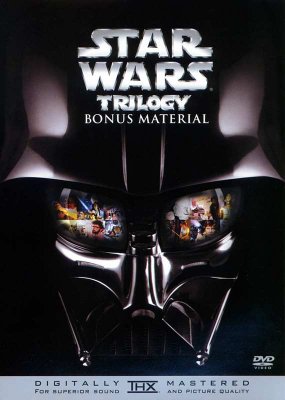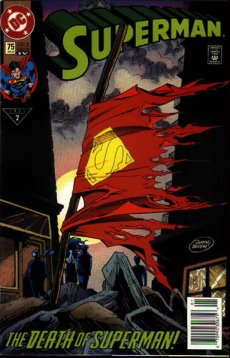Kevin
Burns: So I was very flattered when a year ago
last February, I got a call from Bryan. I'd had lunch with
him maybe a couple of weeks before. Of course, my office
got all excited. For most people, it's (hushed) "Bryan
Singer's calling! Bryan Singer!"
I knew Bryan was about to go to Australia
to do Superman Returns. We met at one of his hangouts.
He said, "I've just cast the actor that's going to do Superman."
It was so funny because at one point (during
the lunch) Bryan was on the phone with Brandon. And I didn't
know who Brandon Routh was; I'd never laid eyes on him.
Bryan was kind of giddy, talking to him. He put the phone
up to my ear while Brandon was talking.
And Bryan was excited, "that's the new
Superman!" and he was looking at me like he could have been
on the phone with Charlie Chaplin. "That's him! That's the
new Superman!"
When he hung up, I said, "Bryan, he's the
new Superman because you made him the new Superman."
He was excited to be talking to the guy that's going to
be Superman, and he'd made it happen!
Derek McCaw: So there's a part of
Bryan that's separate, that's still able to tap into that
feeling of being a fan…
Kevin Burns: He loves it and he
appreciates it. He hasn't lost that childhood love of it.
It's one of the things I most respect about him.
He said to me, "I've met with the people
from Warner Home Video about how they're going to put my
movie out on DVD. They were going to put these kind of very
traditional twenty minute behind the scenes documentaries,
and I said, 'no, no, no. That's not what I want.' This is
Superman. This is big. This is huge. This has to be special."
|
|
|
This is
a documentary you're looking for...
|
He said, "I know Kevin Burns. He's a friend
of mine. I just watched the documentary he did on Cleopatra"
- which I didn't even know he had seen - and Bryan just
went on at that point gushing about the Cleopatra
documentary as if it were the best thing he had ever seen.
The best film about the making of a film, primarily because
he felt that it was so honest and so accurate. And
about Empire of Dreams and about Behind the Planet
of the Apes.
I honestly had no idea, knowing Bryan as
long as I did, that he was such a fan of my stuff. I was
truly flattered. And he said "I want you to do the definitive
documentary on the history of Superman."
"I want us to do it together. It's very
important to me. I would love to work with you, I've always
wanted to work with you," and I said "I've always wanted
to work with you. I've never forgiven myself for turning
down the gig to produce your first feature."
He said, "we need a point of view. If we're
going to do this, it has to have a hook, it has to have
a point of view."
I said, "it has a point of view."
He looked at me like, "I just told you
about this, how could you have a point of view already?"
"The story of Superman is the story of
America. He's the ultimate immigrant. He comes from another
planet. He's trying to assimilate. It's his dilemma. He
can never really become one of us, even though he tries."
Bryan was getting more and more excited.
He was building up like a volcano as I was talking to him.
I said, "his story mirrors the story of
our country. He was created by two Jewish kids in Cleveland.
He was born in the Great Depression. He has kind of bathed
in the blood of World War II, where he comes to full power.
He becomes a symbol of everything that's right and good
about America. In the fifties he becomes institutionalized
and almost square and middle-class. Suburbanized with Lois
Lane and Jimmy Olsen and everything about the suburbs and
the Baby Boom - the George Reeves television show."
"And then George Reeves' suicide tarnishes
the character. Between that and Kennedy's assassination,
it disillusions those very same baby boomers who, like myself,
grew up loving him.'
"Then by the 1970s after Nixon and Watergate
and Viet Nam we've become cynical and disillusioned; he
becomes a joke. Batman was a joke, Superman was a joke.
All of our institutional icons have become a joke."
|
|
|
After
all, it was you and me.
|
"The Christopher Reeve movie did something
to rehabilitate it, but to me personally, Christopher Reeve
played that movie straight and everyone around him was playing
it for laughs. Really, Superman has not had an opportunity
to be reborn in my lifetime until 9/11."
"9/11 changed the way we think of heroes
and gave us an opportunity to embrace them. In short, it's
not only the story of America, it's the story of death and
resurrection."
I swear to God, this was my conversation
with him.
Bryan just went nuts. "Have you ready my
script?"
I said, "no."
"Oh, my god, this is my script. This is
my story. I can't believe what you're telling me. It's so
perfect for what I'm doing."
I said, "well, it makes sense, Bryan, because
it's Superman."
It's
who the character is.
I kind
of knew this because I'd just done this show for Bravo,
Ultimate Superheroes, a countdown show. I had a lot
of familiarity with it.
We wrote up a proposal. It was a very easy
deal. We agreed to be partners and everything was fifty
fifty. We would agree to agree and have mutual control,
which was a big deal.
Everyone around Bryan was just shocked
that he had such confidence in me and was so willing to
share control. God bless him, he's such a control freak.
I was somewhat unaware, because I hadn't seen Bryan all
that much in recent years. Not for any reason other than
our paths had gone in different ways.
I then became aware of a kind of cult of
Bryan Singer and the world of Bryan and the entourage of
Bryan. So it was fascinating, because they don't know me.
I'm not one of the guys he hangs around with.
We have always just had that kind of relationship.
Doing this was a total dream. First of all, the folks at
Warner Brothers - they were modestly impressed with my credentials,
but they were very obliged to let Bryan bring his guy in,
meaning me, to do the doc.
DC is very protective of their characters.
You've got the control freak in Bryan, and the perfectionist
in me. It was just a very big deal. I had to go to New York
and meet with DC and I had several meetings with people
at Warner and Warner Home Video.
It was obvious that Bryan was the one opening
these doors, and Bryan was the one who the studio had a
tremendous amount riding on because of his movie. Everyone
wanted that movie to succeed.
And
also, it was Superman. I would literally sit in a conference
room at Warner Home Video, surrounded by a lot of these
executives and lawyers - tons of lawyers - and I would stop
myself in these meetings where I would hold forth and spin
my yarn. The treatment that I just told you, that was really
the treatment that we had on paper. These people would sit
kind of mesmerized. I would stop and say, "guys, think about
it. It's Superman. How fun is this?"
These hard-boiled corporate types would
find themselves turning into a ten-year-old again. At the
end of the day, everyone was just so buzzed about doing
it.
It
didn't take long to put a production team together. I brought
in my core group of people I love to work with, editors
who I love to work with. For producers, I brought in Mark
McLaughlin, Stacy Zipfel and also Scott Hartford, Kim Sheerin
and Steven Smith, whom I work with all the time.
We
also had a kind of dream team of editors, including Dave
Comtois, who I worked on with Behind the Planet of the
Apes and The Alien Saga. Dave and I went to film
school together. We've been best friends for years; I was
Best Man at his wedding, I'm godfather to his daughter…and
he was also one of the key editors on Empire of Dreams.
So
it was great. It was a lot of work. It was very expensive,
even though the clips were virtually free. It's just that
it was shot on high definition. We did about forty-five
interviews with every major character because we knew that
this had to be definitive. This had to be the comprehensive
story, covering as many of the bases as we could.
Part
Three: Seeing Superman Returns








